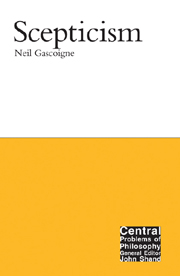Introduction: The whimsical condition of mankind
Summary
For here is the chief and most confounding objection to excessive scepticism, that no durable good can ever result from it; while it remains in its full force and vigour … When [the sceptic] awakes from his dream, he will be the first to join in the laugh against himself, and to confess, that all his objections are mere amusement, and can have no other tendency than to show the whimsical condition of mankind, who must act and reason and believe; though they are not able, by their most diligent inquiry, to satisfy themselves concerning the foundation of these operations, or to remove the objections, which may be raised against them.
(Hume 1975: 159–60)It seems reasonable to open a book such as this with a simple question: What is scepticism? According to Webster's, it is “an attitude of doubt or disposition toward incredulity in general or in regard to something particular”. So scepticism relates to doubt; but what is it to ‘doubt’ or to have a ‘doubting attitude’? Mention scepticism to anyone who has been subjected to an introductory course on ‘The Problems of Philosophy’ and they will probably recall that there are a number of arguments that seem to show that we can doubt, and therefore don't know, many if not all of the things we claim to know. As such, what it is to doubt is associated with certain sorts of thought-experiments like the idea that right now you or I might be dreaming, or a disembodied brain floating around in a vat of nutrients linked up to a supercomputer.
- Type
- Chapter
- Information
- Scepticism , pp. 1 - 5Publisher: Acumen PublishingPrint publication year: 2002

